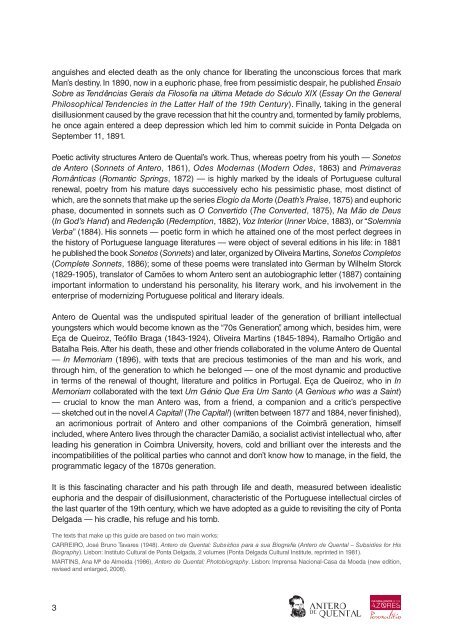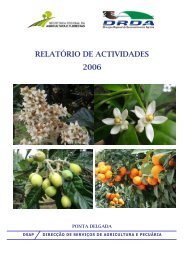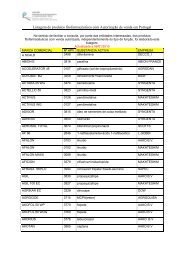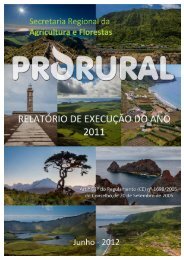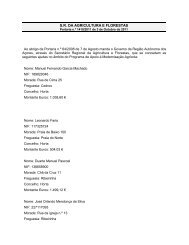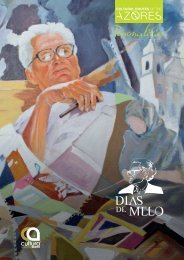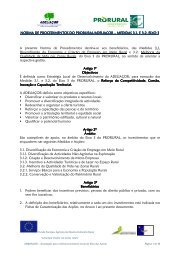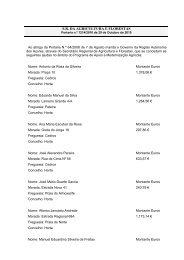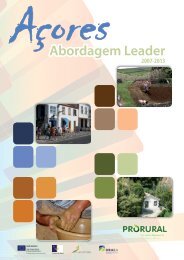Antero de Quental (Inglês)
Antero de Quental (Inglês)
Antero de Quental (Inglês)
Create successful ePaper yourself
Turn your PDF publications into a flip-book with our unique Google optimized e-Paper software.
anguishes and elected <strong>de</strong>ath as the only chance for liberating the unconscious forces that markMan’s <strong>de</strong>stiny. In 1890, now in a euphoric phase, free from pessimistic <strong>de</strong>spair, he published EnsaioSobre as Tendências Gerais da Filosofia na última Meta<strong>de</strong> do Século XIX (Essay On the GeneralPhilosophical Ten<strong>de</strong>ncies in the Latter Half of the 19th Century). Finally, taking in the generaldisillusionment caused by the grave recession that hit the country and, tormented by family problems,he once again entered a <strong>de</strong>ep <strong>de</strong>pression which led him to commit suici<strong>de</strong> in Ponta Delgada onSeptember 11, 1891.Poetic activity structures <strong>Antero</strong> <strong>de</strong> <strong>Quental</strong>’s work. Thus, whereas poetry from his youth — Sonetos<strong>de</strong> <strong>Antero</strong> (Sonnets of <strong>Antero</strong>, 1861), O<strong>de</strong>s Mo<strong>de</strong>rnas (Mo<strong>de</strong>rn O<strong>de</strong>s, 1863) and PrimaverasRomânticas (Romantic Springs, 1872) — is highly marked by the i<strong>de</strong>als of Portuguese culturalrenewal, poetry from his mature days successively echo his pessimistic phase, most distinct ofwhich, are the sonnets that make up the series Elogio da Morte (Death’s Praise, 1875) and euphoricphase, documented in sonnets such as O Convertido (The Converted, 1875), Na Mão <strong>de</strong> Deus(In God’s Hand) and Re<strong>de</strong>nção (Re<strong>de</strong>mption, 1882), Voz Interior (Inner Voice, 1883), or “SolemniaVerba” (1884). His sonnets — poetic form in which he attained one of the most perfect <strong>de</strong>grees inthe history of Portuguese language literatures — were object of several editions in his life: in 1881he published the book Sonetos (Sonnets) and later, organized by Oliveira Martins, Sonetos Completos(Complete Sonnets, 1886); some of these poems were translated into German by Wilhelm Storck(1829-1905), translator of Camões to whom <strong>Antero</strong> sent an autobiographic letter (1887) containingimportant information to un<strong>de</strong>rstand his personality, his literary work, and his involvement in theenterprise of mo<strong>de</strong>rnizing Portuguese political and literary i<strong>de</strong>als.<strong>Antero</strong> <strong>de</strong> <strong>Quental</strong> was the undisputed spiritual lea<strong>de</strong>r of the generation of brilliant intellectualyoungsters which would become known as the “70s Generation”, among which, besi<strong>de</strong>s him, wereEça <strong>de</strong> Queiroz, Teófilo Braga (1843-1924), Oliveira Martins (1845-1894), Ramalho Ortigão andBatalha Reis. After his <strong>de</strong>ath, these and other friends collaborated in the volume <strong>Antero</strong> <strong>de</strong> <strong>Quental</strong>— In Memoriam (1896), with texts that are precious testimonies of the man and his work, andthrough him, of the generation to which he belonged — one of the most dynamic and productivein terms of the renewal of thought, literature and politics in Portugal. Eça <strong>de</strong> Queiroz, who in InMemoriam collaborated with the text Um Génio Que Era Um Santo (A Genious who was a Saint)— crucial to know the man <strong>Antero</strong> was, from a friend, a companion and a critic’s perspective— sketched out in the novel A Capital! (The Capital!) (written between 1877 and 1884, never finished),an acrimonious portrait of <strong>Antero</strong> and other companions of the Coimbrã generation, himselfinclu<strong>de</strong>d, where <strong>Antero</strong> lives through the character Damião, a socialist activist intellectual who, afterleading his generation in Coimbra University, hovers, cold and brilliant over the interests and theincompatibilities of the political parties who cannot and don’t know how to manage, in the field, theprogrammatic legacy of the 1870s generation.It is this fascinating character and his path through life and <strong>de</strong>ath, measured between i<strong>de</strong>alisticeuphoria and the <strong>de</strong>spair of disillusionment, characteristic of the Portuguese intellectual circles ofthe last quarter of the 19th century, which we have adopted as a gui<strong>de</strong> to revisiting the city of PontaDelgada — his cradle, his refuge and his tomb.The texts that make up this gui<strong>de</strong> are based on two main works:CARREIRO, José Bruno Tavares (1948). <strong>Antero</strong> <strong>de</strong> <strong>Quental</strong>: Subsídios para a sua Biografia (<strong>Antero</strong> <strong>de</strong> <strong>Quental</strong> – Subsidies for HisBiography). Lisbon: Instituto Cultural <strong>de</strong> Ponta Delgada, 2 volumes (Ponta Delgada Cultural Institute, reprinted in 1981).MARTINS, Ana Mª <strong>de</strong> Almeida (1986), <strong>Antero</strong> <strong>de</strong> <strong>Quental</strong>: Photobiography. Lisbon: Imprensa Nacional-Casa da Moeda (new edition,revised and enlarged, 2008).3


